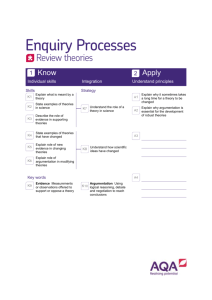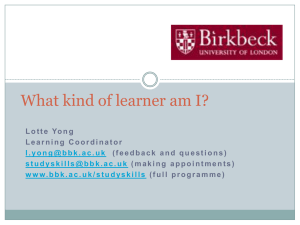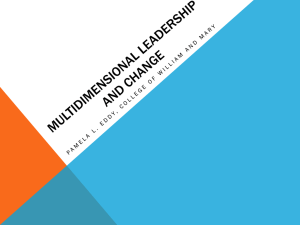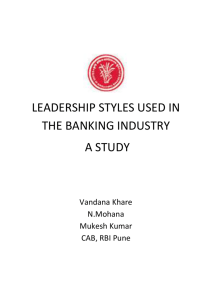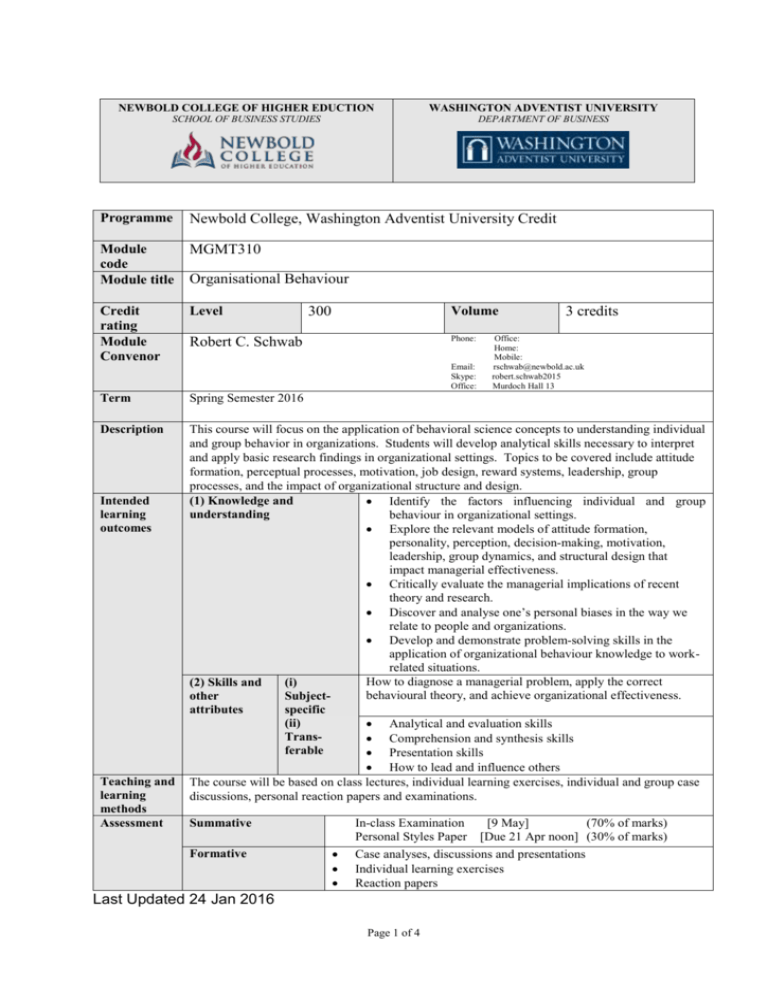
NEWBOLD COLLEGE OF HIGHER EDUCTION
WASHINGTON ADVENTIST UNIVERSITY
SCHOOL OF BUSINESS STUDIES
DEPARTMENT OF BUSINESS
Programme
Newbold College, Washington Adventist University Credit
Module
code
Module title
MGMT310
Credit
rating
Module
Convenor
Level
Organisational Behaviour
300
Volume
Phone:
Robert C. Schwab
Email:
Skype:
Office:
3 credits
Office:
Home:
Mobile:
rschwab@newbold.ac.uk
robert.schwab2015
Murdoch Hall 13
Term
Spring Semester 2016
Description
This course will focus on the application of behavioral science concepts to understanding individual
and group behavior in organizations. Students will develop analytical skills necessary to interpret
and apply basic research findings in organizational settings. Topics to be covered include attitude
formation, perceptual processes, motivation, job design, reward systems, leadership, group
processes, and the impact of organizational structure and design.
(1) Knowledge and
Identify the factors influencing individual and group
understanding
behaviour in organizational settings.
Explore the relevant models of attitude formation,
personality, perception, decision-making, motivation,
leadership, group dynamics, and structural design that
impact managerial effectiveness.
Critically evaluate the managerial implications of recent
theory and research.
Discover and analyse one’s personal biases in the way we
relate to people and organizations.
Develop and demonstrate problem-solving skills in the
application of organizational behaviour knowledge to workrelated situations.
How to diagnose a managerial problem, apply the correct
(2) Skills and
(i)
behavioural theory, and achieve organizational effectiveness.
other
Subjectattributes
specific
(ii)
Analytical and evaluation skills
Trans Comprehension and synthesis skills
ferable
Presentation skills
How to lead and influence others
The course will be based on class lectures, individual learning exercises, individual and group case
discussions, personal reaction papers and examinations.
Intended
learning
outcomes
Teaching and
learning
methods
Assessment
In-class Examination
Personal Styles Paper
Summative
Formative
[9 May]
(70% of marks)
[Due 21 Apr noon] (30% of marks)
Case analyses, discussions and presentations
Individual learning exercises
Reaction papers
Last Updated 24 Jan 2016
Page 1 of 4
Required
text
Suggested
reading
Class participation, suggested readings, question and answer
sessions after lectures and individual tutorials as requested by the
student.
Robbins, Stephen P. and Judge, Timothy A. Organizational Behavior: Pearson International
Version, 13th Edition. Upper Saddle River, New Jersey: Pearson Prentice-Hall, Inc. 2009,
paperback.
Billsberry J (1996) The effective Manager, Milton Keynes, Open University
Buchanan, D. and Huczynski, A., (2010) Organisational Behaviour – An Introductory Text, 7th
Edition, Harlow: FT Prentice Hall
Burnes B (1996), Managing Change, 2nd ed. FT Pitman Publishing
Cooper J C & Robertson I (1995) Work Psychology, FT Pitman Publishing
Fincham R & Rhodes P, (2005), Organizational Behaviour, 4 th ed. , Oxford
Keirsey D. & Bates, M., (1984), Please Understand Me: Character & Temperament Types, or
PUM II, (1998)
Mullins, L. J., Management & Organisational Behaviour (2010), 9 th Edition, FT Pittman Publishing
Schwab, R., Study Guide for Organizational Behavior, (2005) 6th Edition, Andrews University
Statt, D A (2004) Psychology and the World of Work, 2 nd ed., Palgrave Mc Millan
Indicative
content /
Weekly
Schedule
Referencing,
Style and
Submission
Policy
Statement
Wren, D (1994) Evolution of Management Thought, 4nd edition, Wiley
Wk Topics
Chapters
1.
Introduction to Organizational Behavior and Research
(1)
Historical Evolution of OB and Management Thought
2.
Personal Characteristics, Attitudes, Personality, & Values
(2) p76-87, (3) (4)
3.
Perception, Emotions & Decision Making
(5), (8)
4.
Motivation and Learning
(2) p88-100, (6)
5.
Applied Motivation and Reward Systems
(7)
6.
Groups and Group Decision Making
(9), (10)
7.
Leadership, Power & Political Influence
(12-14)
8.
Communication, Change and Conflict
(11), (15), (19)
9.
Organizational Structure, Environment & Culture
(16), (17)
10. Selection, Socialization, Appraisal and Discipline
(18)
11. EXAMINATION
--See the School of Business Programme Handbook for specific requirements for referencing, style
and submission guidelines for all School of Business assignments.
All attendance, formative, summative, late work and plagiarism policies are to be found in the
Handbook of Academic Programmes and Policies.
Page 2 of 4
Examination Questions (as an example)
Students will address FIVE of seven possible questions on the exam… here are two
sample questions…
Sample Question 3.
Individual decision makers often resort to different decision "processes" when trying to make important
decisions. Carefully and thoroughly describe three different decision processes that we explored in class
(like how to purchase a car). In each case, how are decisions made? (Fully describe each process!)
How would you characterize the end result of each decision method? Discuss the strengths or
advantages, and problems or limitations you see with each approach.
Sample Question 5. Analyze the “Nigel” case printed on the back of this sheet.
A)
B)
What is the "problem" with Nigel? Which theories of motivation and personality best describe
his behavior? Justify your choices.
What should we do with Nigel now? Clearly explain what actions you would take and justify
your recommendations. Be sure your recommendations logically "fit" the theory(s) selected in a)
above. To implement your recommendation, who should do what by when? Be specific!
Page 3 of 4
Styles Paper Assignment (as an example)
IF the assigned personal styles topic is LEADERSHIP & POLITICAL INFLUENCE… address all of
the concerns listed below…
1. If other management scholars were to observe you at work; which theories, models, or "styles" would
they use to describe you or your behaviour? Explain why you believe you would be labelled or classified
this way. (IDENTIFY several theories or models, REVEAL the classifications that seem to best "fit" you
in each case, and EXPLAIN why you think others would put you into those categories.)
2. Intellectually, which theoretical approach (or combination of theories, situations, models, or styles) do
you feel are most valid? Which theories would you use in the workplace? Describe these theories and
justify why you would use them. (IDENTIFY your preferred theories or style(s), DESCRIBE how each
theory works, and EXPLAIN WHY you perceive it to be valid/useful.)
3. Intellectually, which theoretical approach (or combination of theories, situations, models, or styles)
makes you feel very uncomfortable? Describe the theory and explain why you find this approach so
difficult or distasteful. (IDENTIFY the approaches or theories you do not like, and explain why you
wouldn’t use them.)
4. What implications does your self-analysis (of 1-3 above) have for the way in which you would
normally relate to your co-workers and associates at work (given that their “styles” and philosophies may
differ from your own)? In which situations do you think it will be easy to function successfully, and
under what conditions or circumstances do you anticipate you will encounter your greatest frustrations
and difficulties? How will you adapt to cope with those “most difficult” work-related situations?
Your assignment should be ~750 words and must be underpinned by appropriate academic
theories and models.
This assignment will form 30% of your overall module mark, and is due on 21 April, 2016 at
12:00a (noon).
Marking criteria
Evidence of background reading, research and application
of appropriate theories and models, etc.
Quality of discussion, relevant examples, depth of analysis,
and evidence of critical thinking
Conclusions
Structure and presentation
----------------
Page 4 of 4
30%
50%
10%
10%


